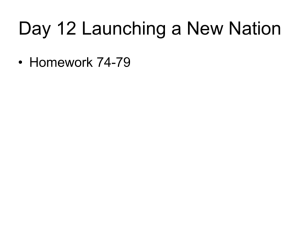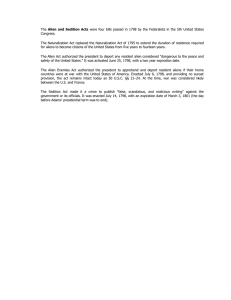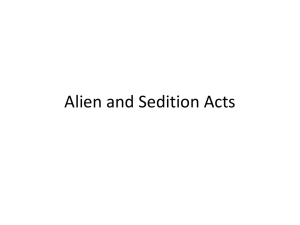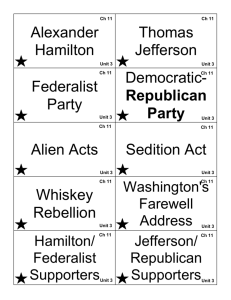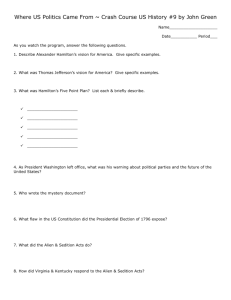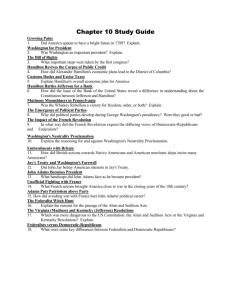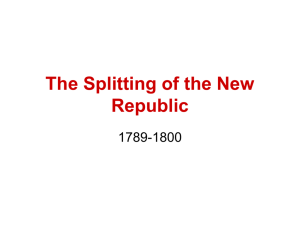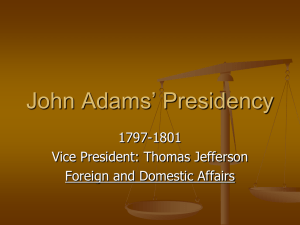Document 14216530
advertisement
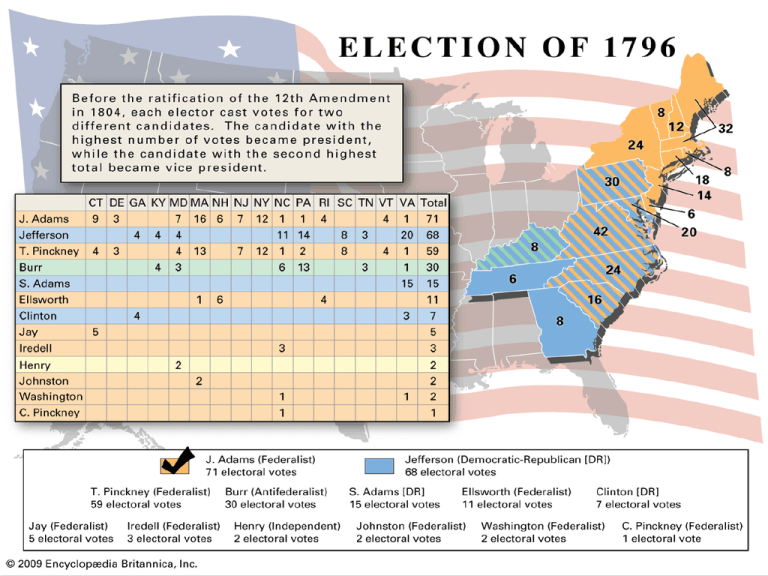
JOHN ADAMS = 2nd President • Washington was President from 1789-1797 • John Adams wins the 2nd Presidential election and will serve from 1797-1801 • What do we already know about him? John Adams takes office • https://www.youtube.com/watch?v=xqAt8A0 W204 The French and the Americans 1789-1799 Washington’s Foreign Policy • What was Washington’s view? • Stay out of it! (Neutral = take no side in a conflict) • Angers Jefferson who supported the French • British and French continue seizing American ships – by this point Adams is president and has to do something about it! XYZ Affair • French send 3 agents (known as X,Y,Z) to offer Americans a deal, but they want $$$ in order to engage in talks AKA : BRIBERY! • Americans furious • Adams chooses to strengthen Navy by building frigates (fast moving ships with guns) to better protect against French Fear of France and criticism at home led Adams and the Federalist Congress to pass the Alien and Sedition Acts There were actually four separate laws making up what is commonly referred to as the "Alien and Sedition Acts“ The Naturalization Act (officially An Act to Establish a Uniform Rule of Naturalization) extended the duration of residence required for aliens to become citizens to 14 years. Enacted June 18, 1798, with no expiration date, it was repealed in 1802. The Alien Friends Act (officially An Act Concerning Aliens) authorized the president to deport any resident alien considered "dangerous to the peace and safety of the United States." It was enacted June 25, 1798, with a two year expiration date. The Alien Enemies Act (officially An Act Respecting Alien Enemies) authorized the president to apprehend and deport resident aliens if their home countries were at war with the United States of America. Enacted July 6, 1798, and providing no sunset provision, the act remains intact today. At the time, war was considered likely between the U.S. and France. The Sedition Act (officially An Act for the Punishment of Certain Crimes against the United States) made it a crime to publish "false, scandalous, and malicious writing" against the government or its officials. It was enacted July 14, 1798, with an expiration date of March 3, 1801 Alien and Sedition Acts • Gave President power to arrest or deport any non-citizen (alien) • Extended time to become an American citizen (from 5 to 14 years) • Outlawed Sedition – the stirring up of rebellion against the government – Citizens could be fined or jailed for criticizing the government – Challenge to 1st amendment (free speech and press) ~ Madison and Jefferson pen the Kentucky and Virginia Resolves, seeking to nullify (or cancel) the A-S acts, claiming they were unconstitutional – (which they were!) Do you agree with Voltaire and/or Jefferson? Why or why not? How much power should the government have over public opinion? A Federalist or a Democratic-Republican? Why? "No Stamp Act, No Sedition Act, No Alien Bills, No Land Tax, downfall to the Tyrants of America; peace and retirement to the President; Long Live the Vice President," Words hung from a liberty pole Massachusetts 1798 Election of 1800 • Republicans backed Jefferson for President and Burr for VP • Federalists supported Adams • Electoral tie between Jefferson and Burr – House of Representatives choose Jefferson as President and Burr as Vice President – 12th amendment will change this process End of Hamilton https://www.youtube.com/watch?v=BfeuU0NB5lg Philip Schuyler, Hamilton's father-in-law, lost his Senate seat to Burr Morgan Lewis, endorsed by Hamilton, defeated Burr in the 1804 New York Gubernatorial election Death of Hamilton • Signals the decline of the Federalist party • Despite decline, its legacy is felt – most of Hamilton’s economic programs would continue on (tariff, bank, bonds) Don’t forget about me!!
